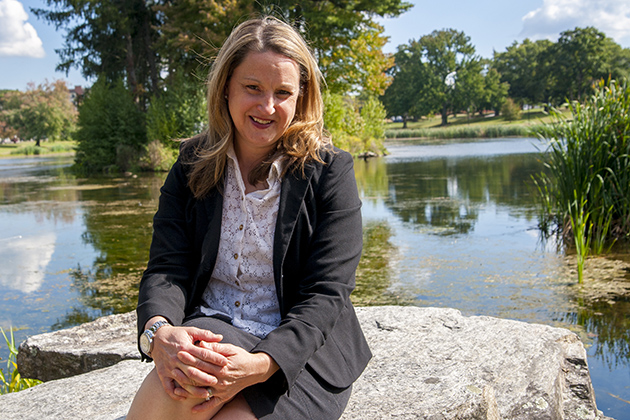
Lisa Park Boush’s extensive career has brought her from the lakes of East Africa and the coasts of the Bahamas to the halls of one of the largest sources of federal funding for science research in Washington, D.C. These experiences make her uniquely qualified for her newest role as director of the Center for Integrative Geosciences and professor of geography in the College of Liberal Arts and Sciences.
Park Boush joined the UConn faculty this fall from the University of Akron. Shortly before arriving in Storrs, she served for three years as program director for the National Science Foundation’s Directorate for Geosciences, where she oversaw grant review processes and helped develop resources for the geoscience research community.
Park Boush calls herself an Earth systems scientist – a term that not only describes her personal scholarly interests, but also captures her comprehensive understanding of geoscience and its applications to a spectrum of disciplines.
“Human beings have always asked things like ‘Who are we? Where do we come from? Why are we here?’” she says. “I’ll leave the last question for the metaphysicians, but the first two are really geoscience questions; they are questions about evolution of Earth and evolution of life. That’s pretty profound.”
Reconstructing climate history
Much of Park Boush’s work involves reconstructing the climate history of coastal and lacustrine regions over different time scales. She uses these histories to track environmental changes – which she says can be caused by factors like human intervention, climate change, and tectonic processes – and how these changes impact ecosystems.
“Scientists know that the Earth as a system has changed through time and that the biosphere and the geosphere are interrelated, but my research tries to find out how those connections are made,” she says.
This line of questioning has brought Park Boush all over the world for climate and biodiversity-related projects. She first conducted fieldwork at lakes in Malawi and Tanzania while she was a Ph.D. student at the University of Arizona. Since then, she has engaged in projects in Indonesia, North America, and the Bahamas.
Her fieldwork involves examining rock sequences and lake deposits, samples of which are obtained from sediment cores extracted from lakebeds. Each layer of sediment reveals a preserved record of pollen, charcoal, and elements that occurred in the atmosphere at a particular point in time. She also notes the distribution of fossilized organisms that may provide clues about environmental temperatures, salinities, and oxygen levels. Together, these fossils help Park Boush to reconstruct climate histories for a region over multiple time scales, which she says are captured “like pages in a book.”
For the past 10 years, Park Boush has applied these techniques in the Bahamas, where she and her colleagues have reconstructed high-resolution records of hurricanes, sea levels, climate, and human-driven environmental changes. She says the Bahamas are particularly vulnerable to sea level rise, and data from this region can help create climate models that predict future scenarios.
“Understanding what happened in the past helps us better understand Earth’s potential operational parameters,” she says.
Supporting good science
Park Boush’s research earned her an invitation to become a National Science Foundation program officer, a rotating position that is offered to top scholars in a field. Program officers work with permanent NSF staff for a set period of time, helping to bring fresh ideas to the foundation and keep each directorate connected to the community of researchers it supports.
Between 2010 and 2013, Park Boush worked in NSF’s Earth Sciences Division of the Geoscience Directorate, which is charged with investigating processes that impact the global environment. She led programs in sedimentary geology and paleobiology, ensuring that funds were used to support projects that were consistent with NSF priorities and represented a well-rounded portfolio of investments for each program.
She also helped develop new resources for the geoscience research community during this time. An example is Earth Cube, a cyber infrastructure project that acts as a portal for all geoscience data.
She says working at NSF “was a tremendous honor and a tremendous responsibility, because human lives are attached to each proposal. The beauty of NSF is that it is a merit-based system, and it funds projects that do good science and help train students.”
Integrative geosciences
“Geosciences is a STEM field that has a tremendous scope,” says Park Boush, noting that the Geosciences Directorate at NSF was larger than those in engineering, mathematics, physics, and biology.
This breadth is at the front of her mind as she looks to develop new opportunities for the Center for Integrative Geosciences, which includes faculty affiliates from the departments of ecology and evolutionary biology, chemistry, physics, geography, marine sciences, and the School of Engineering and the College of Agriculture, Health, and Natural Resources.
“What attracted me to UConn is that the institution is growing and taking on ambitious new initiatives. I like to be part of that kind of atmosphere,” she says.
Park Boush sees major opportunities for the Center to partner with other scholars on campus who study climate change, sustainability, and energy resources. Another focus is to enhance the experience for geoscience undergraduate and graduate students by increasing the number of courses offered and creating more opportunities for international travel and fieldwork.
“Global studies are really relevant to today’s students, and it is one of the biggest advantages that our field offers,” she says.
She also hopes that new Center initiatives will help raise interest and enthusiasm on campus for studying rocks and fossils, which she says offer an exciting look into our planet’s past, present, and future.
“It takes a complete understanding of Earth and how it works,” she says, “to better inform us of what our future world will look like.”


